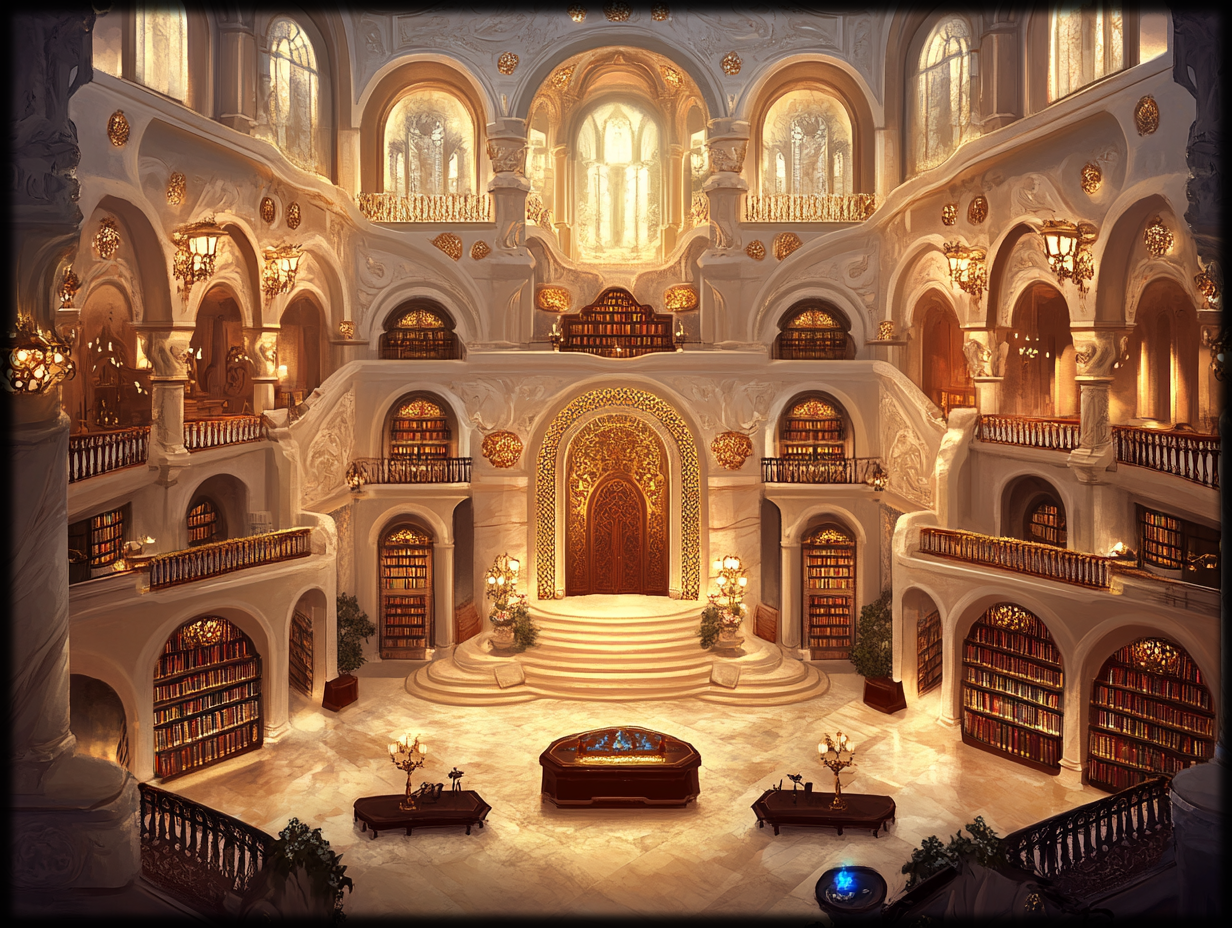Bahara Library
I’ve got stories to tell, whole worlds in my head,
But the ink runs dry when I’m close to the thread
Some things are sacred, too real to share,
Moments too fragile for open air
~Enoch
I’ve got stories to tell, whole worlds in my head,
But the ink runs dry when I’m close to the thread
Some things are sacred, too real to share,
Moments too fragile for open air
~EnochThe Bahara Library stands as a jewel at the edge of the Warda District, its creme-colored marble gleaming as if the dawn itself had chosen to reside within its walls. Colonnades of pearlescent stone bear intricate bas-reliefs depicting the heroes and philosophers of Shal’Azura’s long, tumultuous ascent. Embossed panels of gold leaf and lapis lazuli line the entrance, and above, the city’s crest—a desert rose budding to a dawning sun—captures the rays of the midday sun. The splendor of the facade draws the eye of every passerby, regardless of their errand, and even the most jaded scholars finds themselves momentarily agape at the grandeur of the arched windows that stretch from ground to parapet, four stories above. Light spills through these enormous panes, as well as through the stained glass dome created by Enoch himself, fracturing across the inner halls in bands of gilded brightness and soft, dappled shadow.
Within, the library is a cathedral of knowledge—a sanctuary where silence is sacred and every echo a transgression. Rows upon rows of oak shelves, each a labyrinth in its own right, soar to balconies of polished brass and filigreed iron. Interlocking spirals of stair and mezzanine create the impression of a living, breathing lattice, as if the building itself were a mind forever hungry for more. Between the stacks, chroniclers move with a particular grace: their tunics, always immaculate, are cut from cloth-of-silver so fine that it seems spun from morning mist; their gold-trimmed sashes denote not just rank but years of service, the finest threadwork reserved for the most senior. They are the stewards of memory, every one sworn to a life of devotion to the written word and the preservation of wisdom.
It is whispered that many among them had been born under the Ascendant Sky, their ancestry stretching back to the city’s first levitation. Among these, the most devout regard their roles as sacred callings, a plan set in motion by the mysterious motives of the First Three. There is no knowledge too arcane nor question too trivial: whether battered merchant from the spice routes or a prince of the lower terraces, every seeker of knowledge is met by the same careful bow, the same gentle inquiry. “Know you the words that have traveled far?” is the traditional greeting, delivered with a smile that hint at the subtle joy of their calling.
Some patrons come in pursuit of ancient heresies, others to unearth lost treaties or decode the cryptic marginalia of long-missing alchemists. To these ends, the chroniclers wield their expertise with the efficiency of a master craftsman. They navigate the labyrinth with enviable speed, fingers trailing along the spines of the bound volumes, eyes darting to the alphanumeric sigils etched in platinum. The soundscape is a soft whisk-whisk of parchment and papyrus, interrupted only by the dry cadence of quills against vellum as they record the day’s loans in the register.
For those of higher privilege, there exist secretive annexes: climate-controlled vaults where maps of the old continents are preserved alongside the correspondence of emperors and the sealed testimonies of traitors. These areas, forbidden to the layperson and guarded by mnemonic locks, can only be accessed by members of the Bureau of the Edictum—the most unassailable division within the Library’s structure. The Bureau not only catalogue every writ, decree, and codex ever issued by the above or below, but also maintain the living record of every verdict rendered by the city’s courts. It is here, beneath the hush of the great dome and the watchful gaze of Lorekeeper statues, that the true power of the Library is made manifest.
Founding Date
57 AC
Alternative Names
The Archivists
Type
Library
Parent Location
Owning Organization



Comments